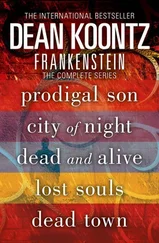Junior flung back the covers and came to his feet, but his knees proved weak, and he sat at once on the edge of the bed.
The room was bright enough for him to confirm that he was alone. The interior of the box in which Naomi now resided could be no more silent than this house.
The coins were arranged atop a playing card, which lay facedown.
He slipped the card out from under the change, turned it over. A joker. Printed in red block letters across the card was a name, BARTHOLOMEW.
FOR THE BETTER PART of a week, on doctor's orders, Agnes avoided stairs. She took sponge baths in the ground-floor powder room and slept in the parlor, on a sofa bed, with Barty nearby in a bassinet.
Maria Gonzalez brought rice casseroles, homemade tamales, and chile rellenos. Daily, Jacob made cookies and brownies, always a new variety, and in such volume that Maria's plates were heaped with baked goods each time they were returned to her.
Edom and Jacob came to dinner with Agnes every evening. And though the past weighed heavily on them when they were under this roof, without fail they stayed long enough to wash the dishes before fleeing back to their apartments over the garage.
On Joey's side, there was no family to provide help. His mother had died of leukemia when he was four. His dad, fond of beer and brawling—like father not like son-was killed in a bar fight five years later. Without close relatives willing to take him in, Joey went to an orphanage. At nine he wasn't prime adoption material-babies were what was wanted-and he'd been raised in the institution.
Although relatives were in short supply, friends and neighbors aplenty stopped by to help Agnes, and some offered to stay with her at night. She gratefully accepted assistance with the housecleaning, laundry, and shopping, but she declined the all-night company because of her dreams.
Routinely she dreamed of Joey. Not nightmares. No blood, no reliving of the horror. In her dreams, she was on a picnic with Joey or at a carnival with him. Walking a beach. Watching a movie. A warmth pervaded these scenes, an aura of companionship, love. Except eventually she always glanced away from Joey, and when she looked again, he was gone, and she knew that he was gone forever.
She woke weeping from the dreams, and she wanted no witnesses. She wasn't embarrassed by her tears. She just didn't want to share them with anyone but Barty.
In a rocking chair, holding her tiny son in her arms, Agnes cried quietly. Often, Barty slept through her weeping. Awakened, he smiled or squinched his face into a puzzled frown.
The infant's smile was so captivating and his puzzlement so comically earnest that both expressions worked on Agnes's misery as surely as yeast leavens dough. Her bitter tears turned sweet.
Barty never cried. In the hospital neonatal unit, he'd been a marvel to the nurses, because when the other newborns were squalling in chorus, Barty had been unfailingly serene.
Friday, January 14, eight days after Joey's death, Agnes closed the sofa bed, intending to sleep upstairs from now on. And for the first time, since coming home, she cooked dinner without resort to friends'
casseroles or to the treasures in her freezer.
Maria's mother, visiting from Mexico, was babysitting, so Maria came without her children, as a guest, joining Agnes and the laugh-a-minute Isaacson twins, chroniclers of destruction. They ate in the dining room, rather than at the kitchen dinette, with a lace-trimmed tablecloth, the good china, crystal wineglasses, and fresh flowers.
Serving a formal dinner was Agnes's way of declaring-to herself more than to anyone else in attendance-that the time had come for her to get on with life for Bartholomew's sake, but also for her own.
Maria arrived early, expecting to assist with final details in the kitchen. Though honored to be a guest, she wasn't able to stand by with a glass of wine while preparations remained to be made.
Agnes at last relented. “Someday, you're going to have to learn to relax, Maria."
“I am always enjoy to being useful like a hammer."
“Hammer?"
“Hammer, saw, screwdriver. I am always to be happy when useful in such way like tool is useful."
“Well, please don't use a hammer to finish setting the table."
“Is joke.” Maria was proud of correctly interpreting Agnes.
“No, I'm serious. No hammer."
“Is good you are joke."
“It's good I can joke,” Agnes corrected.
“Is what I say."
The dining table could accommodate six, and Agnes instructed Maria to set two places on each of the long sides, leaving the ends unused. “It'll be cozier if we all sit across from one another."
Maria arranged five place settings instead of four. The fifth—complete with silverware, waterglass, and wineglass-was at the head of the table, in memoriam of Joey.
As she struggled to cope with her loss, the last thing Agnes needed was the reminder posed by that empty chair. Maria's intentions were good, however, and Agnes didn't want to hurt her feelings.
Over potato soup and an asparagus salad, the dinner conversation got off to a promising start: a discussion of favorite potato dishes, observations on the weather, talk of Mexico at Christmas.
Eventually, of course, dear Edom held forth about tornadoes—in particular the infamous Tri-State Tornado of 1925, which ravaged portions of Missouri, Illinois, and Indiana.
“Most tornadoes stay on the ground twenty miles or less,” Edom explained, “but this one kept its funnel to the earth for two hundred nineteen miles! And it was one mile wide. Everything in its path—torn, smashed to bits. Houses, factories, churches, schools-all pulverized. Murphysboro, Illinois, was wiped off the map, erased, hundreds killed in that one town."
Maria, wide-eyed, put down her silverware and crossed herself.
“it totally destroyed four towns, as if they were hit by atom bombs, tore up parts of six more towns, destroyed fifteen thousand homes. That's just the homes. This thing was black, huge and black and hideous, with continuous lightning snapping through it, and a roar, they said, like a hundred thunderstorms booming all at once."
Again, Maria crossed herself “Six hundred ninety-five people were killed in three states. Winds so powerful that some of the bodies were thrown a mile and a half from where they were snatched off the ground."
Apparently Maria wished that she'd brought a rosary to dinner. With the fingers of her right hand, she pinched the knuckles of her left, one after the other, as if they were beads.
“Well,” Agnes said, “thank the Lord, we don't have tornadoes here in California."
“We have dams, though,” said Jacob, gesturing with his fork. “The Johnstown Flood, 1889. Pennsylvania, sure, but it could happen here. And that was a one, let me tell you. The South Fork Dam broke. Wall of water seventy feet high totally destroyed the city. Your tornado killed almost seven hundred, but my dam killed two thousand two hundred and nine. Ninety-nine entire families were swept from the earth. Ninety-eight children lost both parents."
Maria stopped praying with her knuckle rosary and resorted to a long swallow of wine.
“Three hundred and ninety-six of the dead were children under the age of ten,” Jacob continued. “A passenger train was tumbled off the tracks, killing twenty. Another train with tank cars got smashed around, and oil spilled across the flood waters, ignited, and all these people clinging to floating debris were surrounded by flames, no way to escape. Their choice was being burned alive or drowning."
“Dessert?” Agnes asked.
Over generous slices of Black Forest cake and coffee, Jacob at first held forth on the explosion of a French freighter, carrying a cargo of ammonium nitrate, at a pier in Texas City, Texas, back in 1947. Five hundred and seventy-six had perished.
Читать дальше











